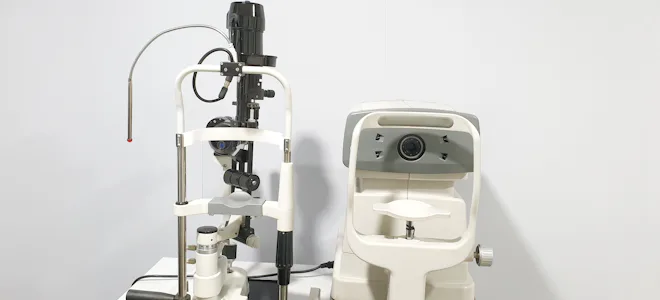Is OCT the new standard - and can you afford it?
Table of Contents
Many of the national optical retail chains are introducing optical coherence tomography (OCT) imaging across their stores.
For over a decade, clinical practitioners have been performing OCTs in the primary care setting. There was at first a mixed response by the public to paying for additional diagnostic tests, along with the ethical dilemma presented when a patient whose presenting symptoms require an OCT declined a scan because of the cost. Now, three generations of OCT have come and gone, and the public is becoming used to the idea that a scan is part of their eye test.
This means that if OCT is not part of the test you offer, this could put your practice at a disadvantage. Customers expect the highest standards of care when it comes to their eyes and, if they don’t feel that you can provide it, they will go to your competitors - the big chains - who will.
Many practices list the benefits of offering OCT, including improving the clinical profile of the practice, making it more attractive both to patients and clinical staff, and improving the ability of a practice to spot problems before they become too established and too late deal with.
Should you be using OCT?
Of course, it is an established principle in all branches of medicine that you should only ever perform a diagnostic test when it is clinically indicated. This is enshrined in section 7.6 of the GOC Standards of Practice and section D3 of the College’s Guidance for professional practice. And there are sound reasons for this.
Indiscriminate use of diagnostic tests can be a problem in any field of medicine. It increases false-positive referrals and so results in avoidable distress to patients. Any diagnostic test should really be needed - and it is, of course, possible to give an eye test - and a full exam, without OCT. But on the other hand, OCT is free from direct harm, and where there is a clear clinical indication, such as a suspicion of wet AMD, then OCT is certainly a valuable addition to diagnostic decision making.
So do you need OCT? Who should decide?
Section A35 of the College guidance makes it quite clear that you need to use your professional judgement to decide on tests performed during an eye examination. As an optometrist, you are in the best position to conclude a baseline OCT examination is necessary to aid the detection of many kinds of disease and abnormality. You may want to use it particularly with historical macular changes such as macula oedema or vitreoretinal traction, or even in glaucoma.
Increasing numbers of practitioners are offering a menu of assessments to ensure the examination really is focused on the concerns of patients’ needs and an assessment without the constraints of the sight testing regulations. You may, for example, choose to build the test around an NHS MECS protocol, but you are always free to follow your own professional instincts. You are the professional providing the examination and you have professional freedom.
After all, a generation ago, the mainstay device for ocular assessment in an optometry practice was the direct ophthalmoscope. Binocular indirect ophthalmoscopy has become widely accepted as the primary method of clinical assessment alongside fundus photography. You could argue that OCT is simply the next logical step to become part of what we will, in the future, consider a standard ocular assessment.
The general adoption of OCT has plenty of benefits for patients, and it is certainly exciting for the profession. However, its success will be influenced by the quality of education, training and experience of the optometrists using the more recent technology, and the detail of how it is used. If progress in technology is to benefit the patient, investment in quality-assured training supporting the ability to make value judgments is as important as the significant investment that must be made in the instrument itself.
People will continue to need visual correction and that will be an ongoing core role for you as an optometrist and the core of the retail side of your business, with frames and lenses offering endless variations and opportunities for profitable sales.
But the medical side of the profession is important too, and regular ocular health assessment is absolutely essential for avoiding preventable sight loss. Diversifying into new assessments could be a prudent way to futureproof your practice - especially as it looks as though OCT will become mainstream.
The help you need for your optician's practice
At Rangewell, we can help you find the finance required for all types of business costs - including the costs of introducing OCT and other optician equipment, which can easily be into five figures.
We often find that the solution could actually lie with an Asset Finance arrangement. With Hire Purchase, you can spread the cost of buying your OCT installation over up to five years, while with leasing, you can simply pay a fixed monthly payment for as long as your practice needs it.
But, whatever the size of your practice, from a single shopfront to a whole chain - and however exciting your plans - at Rangewell, we can provide the scale of funding you need. Simply call us to find out more.

